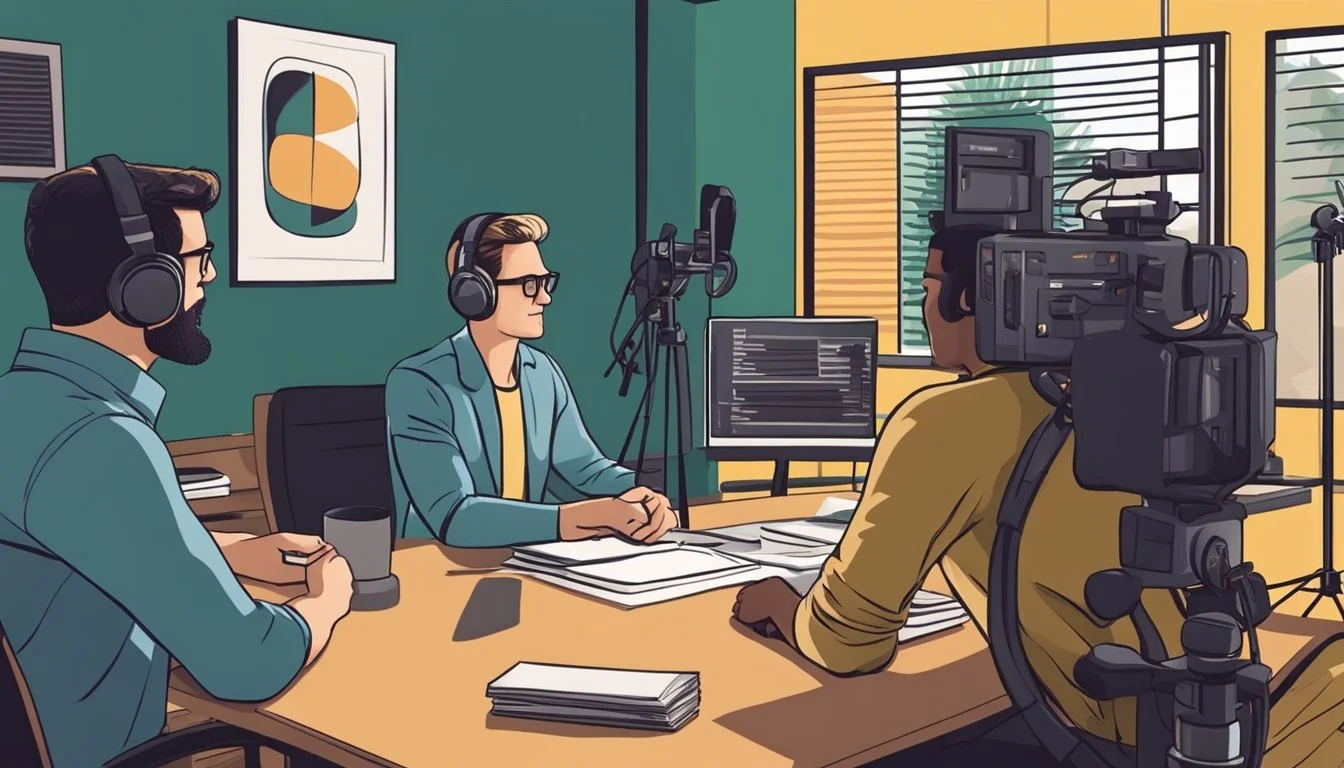Mariana van Zeller Shares Investigative Insights on Joe Rogan Podcast
Investigative Journalist's Insightful Podcast Appearance
Mariana van Zeller, an acclaimed Portuguese-American journalist and documentarian, has made multiple appearances on the Joe Rogan Experience podcast. Her compelling interviews with Joe Rogan offer unique insights into the world of investigative journalism and undercover reporting on dangerous black market
Van Zeller's background in international relations and her extensive experience in journalism shine through during these conversations. Born in Portugal and having worked for major networks, she brings a global perspective to her discussions with Rogan.
The Joe Rogan Experience episodes featuring Mariana van Zeller delve into her work on "Trafficked," a National Geographic television series. This show takes viewers on a journey through some of the most perilous black markets worldwide, showcasing van Zeller's courage and dedication to uncovering hidden truths.
Mariana van Zeller: Career Overview
Mariana van Zeller has built an impressive career as an investigative journalist and documentary filmmaker. Her work has taken her to dangerous locations around the world as she reports on complex global issues.
Early Life and Education
Born on May 7, 1976 in Cascais, Portugal, van Zeller developed an early interest in international affairs. She studied international relations at the Universidade Lusíada de Lisboa, laying the groundwork for her future career.
After completing her education, van Zeller began working as a journalist at SIC, Portugal's largest private television network. This experience provided valuable training in broadcast journalism and reporting.
Journalism and Documentary Work
Van Zeller's career advanced as she took on increasingly high-profile assignments. She became a correspondent for the Vanguard documentary series on Current TV, covering stories around the world.
Her in-depth reporting and willingness to investigate dangerous situations earned van Zeller acclaim. She later joined Fusion as chief correspondent, further expanding her reach and impact as a journalist.
In recent years, van Zeller has focused on creating documentaries for National Geographic. Her work explores complex topics like illegal wildlife trade, black markets, and human trafficking.
The Making of 'Trafficked'
'Trafficked with Mariana van Zeller' represents the culmination of van Zeller's expertise in investigative journalism. The documentary series takes viewers inside criminal enterprises and black markets globally.
Van Zeller's approach combines thorough research with on-the-ground reporting. She interviews key figures involved in illegal trades, providing unique insights into shadowy operations.
The series covers diverse topics like drug trafficking, counterfeiting, and tiger trafficking. Van Zeller's intrepid reporting style and ability to gain access to dangerous situations are central to the show's success.
The Joe Rogan Experience
The Joe Rogan Experience has become one of the most popular podcasts globally, known for its long-form conversations and diverse guest lineup. It has significantly impacted the podcasting industry and public discourse on various topics.
Podcast Evolution and Impact
The Joe Rogan Experience launched in 2009 as a free video and audio podcast. Initially featuring casual conversations with Rogan's comedian friends, it quickly expanded to include guests from various fields. The show's format allows for in-depth discussions, often lasting several hours.
Rogan's relaxed interviewing style and willingness to explore controversial topics have attracted a large audience. The podcast's success has led to lucrative deals, including a reported $100 million exclusive licensing agreement with Spotify in 2020.
The show's influence extends beyond entertainment, sometimes affecting stock prices and public opinion on scientific and political issues. Critics argue it provides a platform for misinformation, while supporters praise its open dialogue approach.
Notable Episodes and Guests
The Joe Rogan Experience has featured a wide range of guests, from scientists and politicians to actors and athletes. Some notable appearances include:
Elon Musk (2018, 2020): The Tesla CEO's episodes garnered significant attention, particularly when he smoked marijuana on air.
Bernie Sanders (2019): The senator and presidential candidate discussed his political platform.
Neil deGrasse Tyson: The astrophysicist has appeared multiple times, discussing space and science.
Mariana van Zeller, an investigative journalist, has been a guest on the podcast twice. Her episodes (#1576 and #2092) focused on her work in exploring dangerous black markets worldwide for her National Geographic series "Trafficked."
Other popular guests include comedians like Bill Burr, scientists like Brian Cox, and controversial figures like Alex Jones. These diverse interviews have contributed to the show's wide appeal and cultural impact.
Intersection of Journalism and Podcasting
Mariana van Zeller's appearances on the Joe Rogan Experience showcase the powerful synergy between investigative journalism and long-form podcasting. This collaboration allows for in-depth exploration of complex topics and brings hard-hitting reporting to new audiences.
Bringing Investigative Reporting to Podcasts
Van Zeller's journalistic expertise shines through in her podcast appearances. She shares insights from her undercover work and global investigations, providing listeners with a behind-the-scenes look at dangerous black markets.
The long-form podcast format allows van Zeller to delve into the nuances of her reporting, explaining complex issues in detail. This depth is often not possible in traditional media formats.
Podcasts like Joe Rogan's offer a platform for journalists to discuss their work without time constraints, enabling richer storytelling and analysis.
In-depth Discussions on 'Trafficked'
On the Joe Rogan Experience, van Zeller discusses her National Geographic series "Trafficked". These conversations provide valuable context to the show's production and the risks involved in investigating illicit trades.
Van Zeller shares anecdotes from her encounters with criminals and details the process of gaining trust in dangerous environments. This insider perspective gives listeners a deeper understanding of the challenges faced by investigative journalists.
The podcast format allows for exploration of ethical dilemmas and safety concerns that arise during the filming of "Trafficked", enriching viewers' understanding of the show.
Outreach and Public Engagement
Podcasts serve as a powerful tool for journalists like van Zeller to reach new audiences. The Joe Rogan Experience, with its massive listenership, exposes her work to people who might not typically engage with investigative journalism.
These appearances help build van Zeller's public profile, potentially leading to increased viewership for "Trafficked" and greater awareness of the issues she covers.
The conversational nature of podcasts allows van Zeller to connect with listeners on a personal level, making complex topics more accessible and engaging to the general public.
Mariana van Zeller on the Joe Rogan Experience
Mariana van Zeller, an award-winning investigative journalist, has appeared on the Joe Rogan Experience podcast multiple times. Her conversations with Joe Rogan have covered topics related to her work on National Geographic's "Trafficked" series.
Episode Highlights
During her appearances, van Zeller shared insights from her investigations into global black markets. She discussed her experiences infiltrating criminal networks and exploring dangerous underworlds. The journalist recounted harrowing encounters with drug cartels, human traffickers, and counterfeit goods operations.
Van Zeller also delved into the complexities of illicit economies and their impacts on society. She explained how some black markets arise from genuine needs in underserved communities. The conversations touched on the blurred lines between legality and survival in certain parts of the world.
Rogan and van Zeller explored the ethical dilemmas faced by investigative journalists in high-risk situations. They discussed the challenges of maintaining objectivity while gaining trust from dangerous subjects.
Public Reception and Feedback
Listeners praised van Zeller's episodes for providing unique perspectives on global issues rarely covered in mainstream media. Many appreciated her courage in pursuing dangerous stories and her ability to humanize complex subjects.
Some fans noted the chemistry between Rogan and van Zeller, highlighting their engaging discussions. The episodes received positive feedback for balancing serious topics with moments of levity.
Critics pointed out the potential risks of glamorizing criminal activities. However, supporters argued that van Zeller's work raises important awareness about societal issues. The episodes sparked debates on social media about the role of journalism in exposing hidden worlds.
The Role of Documentaries in Modern Media
Documentaries like "Trafficked" serve as powerful tools for informing and engaging audiences on complex issues. They provide unique insights into hidden worlds and shed light on important social topics through compelling storytelling and investigative journalism.
Challenges and Opportunities
Documentaries face the challenge of balancing entertainment value with factual accuracy. Filmmakers must captivate viewers while maintaining journalistic integrity. "Trafficked" exemplifies this by exploring dangerous underworld networks in an engaging yet responsible manner.
Streaming platforms have created new opportunities for documentary distribution. This expanded reach allows films to find niche audiences and tackle specialized subjects. However, the crowded media landscape means documentaries must work harder to stand out.
Advanced technology has made documentary production more accessible. High-quality cameras and editing software enable independent filmmakers to create professional-grade content on smaller budgets.
Influence on Public Perception
Documentaries shape public understanding of critical issues by providing in-depth exploration beyond typical news coverage. Mariana van Zeller's work in "Trafficked" offers viewers a nuanced look at illicit industries, challenging preconceptions.
These films can spark social change by raising awareness and motivating action. By presenting compelling evidence and human stories, documentaries inspire viewers to engage with important topics.
Ethical considerations play a crucial role in documentary filmmaking. Producers must carefully weigh the potential impacts of their work on subjects and society. This responsibility extends to ensuring fair representation and avoiding sensationalism.
Future of Investigative Journalism
Investigative journalism faces transformative changes driven by technology and evolving media landscapes. New approaches to storytelling and collaboration are reshaping how journalists like Mariana van Zeller conduct in-depth reporting and share their findings with audiences.
Media Convergence and Collaboration
Investigative journalists increasingly collaborate across platforms and organizations. Traditional media outlets partner with podcasts, streaming services, and social media to expand reach. This convergence allows for multi-format storytelling, combining long-form articles, video documentaries, and interactive content.
Reporters like van Zeller leverage these partnerships to bring complex investigations to diverse audiences. Her work on "Trafficked" exemplifies how documentaries can translate to podcast discussions, enhancing public understanding of critical issues.
Collaborative networks of journalists tackle large-scale investigations, pooling resources and expertise. This approach enables deeper dives into global issues that span borders and industries.
Emerging Platforms and Technologies
New technologies are transforming investigative methods and presentation. Data journalism tools allow for analysis of vast information sets, uncovering patterns and connections. Virtual and augmented reality create immersive experiences, letting audiences explore investigative findings firsthand.
Blockchain technology offers secure ways to protect sources and verify information. AI assists in sifting through large datasets and identifying leads. These tools enhance journalists' capabilities without replacing human insight and storytelling skills.
Mobile-first reporting caters to changing consumption habits. Short-form video platforms and interactive mobile experiences make complex investigations more accessible to younger audiences.





